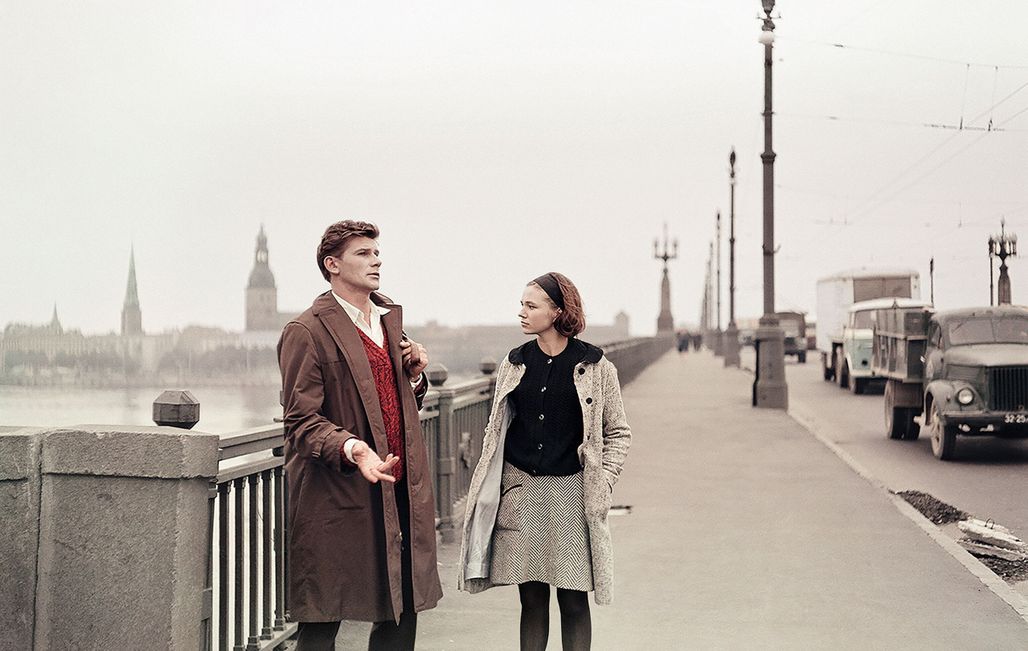
Four white shirts: interview with Rolands Kalniņš

With his 1967 film Cetri Balti Krekli (Four white shirts), Rolands Kalniņš presented a subtle critique of the Soviet totalitarian regime via musical comedy. It was banned from screens for twenty years, shown in public for the first time in 1986 and restored in 2017 to mark the filmmaker's 95th birthday. Cannes Classics is offering a chance to rediscover the masterpiece of Latvian Cinema with Rolands Kalniņš in attendance.
What was the context in which you wrote the script?
The film is based on the play by Gunārs Priede. The Director of Photography Miks Zvirbulis and I saw the stage premiere. We immediately understood that we wanted to turn this play into a film, so we asked the playwright to produce a film script. The idea of how strong the abstract notion ‘there is an opinion’ can be under an ideological dictatorship seemed very important and topical to me at that moment. There was no single official in charge who could assume responsibility and prohibit something, there was just an abstract, anonymous wall which creative people could not break through.
However, in a wider context, we were making a film about ‘what was in the air’ at the beginning of 1960s, when a freer spirit ruled in the USSR and consequently in Latvia too; when life had become more colourful and courageous in comparison to the torpidity of totalitarianism and personality which had ruled during the previous decades. During the making of the film, we were inspired by other arts which were also flourishing thanks to the creative freedom in Latvia. For example, collections by young poets, which brought a breath of fresh air. Māris Čaklais, the lyricist for our films, was among the young talents of the time who have now become outstanding figures of Latvian culture.
Did you encounter any constraints while making the film?
We did not encounter any obstacles during the shooting. During the making of Four white shirts we were just told at every official assessment of the production that the protagonist, Cezars, was too much of a hooligan, too unrestrained, that his character should be more submissive and more ‘polite’. We did not listen because we regarded it as impossible to change our protagonist and thus change the conflict and the idea of the film. Eventually someone from the assessors said: "the authors of the film are as obstinate as that Cezars of theirs!"
Why was the film censored? Did you think, while you were filming it, that your film would be banned in Latvia?
We tempted fate when we shot the most risky episode in the film. We asked the playwright to write the scene especially where various ignorant, powerful people discuss Cezars' songs and their lyrics and conclude that a Soviet citizen must not write or listen to such songs. That discussion was only reported in the play, but cinema is a visual art; we have to see things, rather than hear about them.
The empty words exchanged in the discussion were a harsh satire of the ideological Soviet dictatorship and of the many absurd obstacles put in the way of young, creative spirits at the time. Which meant the scene irritated every official who watched it and was suddenly faced with their own reflection.
The film was only expected to have one screening, not a premiere, but a public discussion screening attended by several higher [communist] party executives. We never found out their opinion, but the planned showing of the film in Leningrad at that time was cancelled, together with other screenings and the film simply disappeared from the world. No shows, no reviews. It was not included in my filmography: nowhere. And there was not the slightest hope that someday, may years later, someone would see this forbidden film – for we had no grounds to think that anything could change in the world order.
Your film Stone and Flinders was also banned and the film reels of Maritime Climate have been destroyed. What other kinds of pressure have you been subject to?
During my lifetime I have not been repressed in any other areas. As to the other films, everything was usually decided at the script stage; if the theme was risky and someone thought that I would develop it in too liberal a way, I was simply not allowed to start shooting. There are almost ten scripts that I very much wanted to develop and turn into films, but I was not allowed to go on working with them. However, there are several films that I was able to direct the way I wanted to.
What are your views on the film industry in your country today?
I follow all the new developments in Latvian cinema very carefully. I still watch the latest films regularly in the cinema and I am happy the Latvian film industry is flourishing. It started three or four years ago and now that films dedicated to Latvia’s centennial are being previewed, I can see that we have a very great creative potential.


